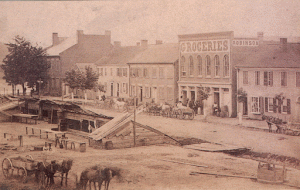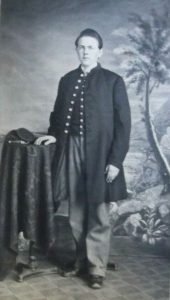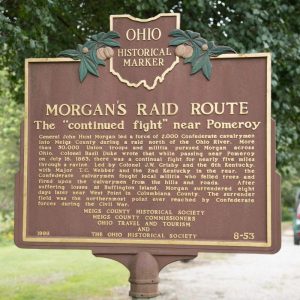A Pleasant Kind of Duty: Ohio’s Trumbull Guards
Last year I shared a few essays on the Departmental Corps, infantry companies of eastern Ohio and western Pennsylvania who served briefly as part of the Department of the Monongahela. I have long been interested in these independent regiments and companies who served in limited capacities, often in the backwaters of the Civil War. These organizations typically don’t show up in the history books. They did not publish regimental histories following the war, and don’t have monuments on battlefields or city squares. As such, they are typically discounted as being unimportant to the history of the war, that their contributions seemingly pale in comparison to those regiments who bore the battle. On the contrary, in performing these behind-the-lines duties, they freed up those more battle-ready regiments to go to the front – the same duties envisioned in calling up the midwestern national guard regiments in the spring of 1864. As I have hoped to demonstrate, these units have interesting stories of their own. Today I would like to share the story of another such organization, the Trumbull Guards.
In the spring of 1862, Warren, Ohio mayor Charles W. Smith secured a commission to raise an independent company of infantry for service at Gallipolis, Ohio. Smith was a well-respected attorney in Warren and had been active in raising troops and funds towards the war effort in northeastern Ohio. His recruiting efforts promised “a pleasant kind of duty,” and that their service “will not be severe.” The company’s field of service would likewise be restricted within the borders of Ohio, ensuring that Smith’s men would “escape the exposure and hardships incident to the more active service.” In short order the company was filled out with 95 men and departed for Gallipolis in late June 1862.

Located on the Ohio River in the southeastern part of the state, Gallipolis was ideally situated to play a prominent role in the Civil War. Camp Carrington was established there in 1861 as a training camp, and in April 1862 a U.S. Army General Hospital was established in Gallipolis to care for sick and wounded Union soldiers and Confederate prisoners from the Kanawha Valley. The U.S. Quartermaster Department also utilized Gallipolis as a depot for vast stores of commissary, materiel, and horseflesh. The Trumbull Guards were quartered on the square in downtown Gallipolis and served as provost guard, as well as nurses and cooks at the military hospital, while Captain Smith served commandant of the military post at Gallipolis until June 1864.
On several occasions the war would arrive on the doorstep of Gallipolis. In the fall of 1862, Confederate cavalry under General Albert G. Jenkins, after crossing into Ohio to gather horses, passed within a few miles of Point Pleasant, (West) Virginia, located just across the river from Gallipolis. Jenkins returned to Point Pleasant the following spring. Bypassing a Federal garrison following a sharp skirmish at Hurricane Bridge, Jenkins arrived at Point Pleasant on March 30, 1863 and attacked the small Federal garrison holed up in the county courthouse.
During the skirmish, Captain Smith dispatched the Trumbull Guards across the Ohio River to support the Federal garrison, while Smith remained in Gallipolis, organizing and arming two companies of convalescents from the hospital. Smith boasted that upon arriving at Point Pleasant, the Guards “proceeded to kill and capture…not one of my men wavered. The enemy fled before them like chaff before the wind.” Despite Smith’s crowing, most sources agree that his company had arrived only shortly before Jenkins men retired from Point Pleasant after failing to dislodge the Federal garrison, though successful in destroying a large quantity of commissary. The Guards scoured the area following the skirmish and collected several of Jenkins men as prisoners.

Praise for the company was effusive following the attack on Point Pleasant. Captain Enoch P. Fitch, stationed at Point Pleasant as Chief Quartermaster of the District of Western Virginia, telegraphed Governor Francis Pierpont that “all praise is due” to Captain Smith and the Trumbull Guards. Local newspapers reported that the Trumbull Guards “were amongst the first to cross the river and conducted themselves like veterans…their prompt action and bravery is worthy of the highest praise,” and that the company’s “orderly conduct and gentlemanly deportment…upon the recent visit of the doubtable Jenkins, attracted universal attention, and elicited much praise.”
The Trumbull Guards turned in their finest performance during John Hunt Morgan’s July 1863 raid through Indiana and Ohio. On July 18, Captain Smith, commanding the Trumbull Guards and a group of local militia, blocked Morgan’s route from the Ohio River crossing at Pomeroy, forcing Morgan north towards Portland and Buffington Island. Shifting north to meet Morgan, the Trumbull Guards and militiamen took positions atop a three-mile ravine stretch commanding Laurel Cliff Road, on which Morgan would need to pass. Later recalled by Morgan’s men as ‘The Gauntlet,’ Smith’s men felled trees across the road, and from their elevated positions dropped nineteen raiders along the stretch, slowing Morgan’s command, and allowing two Federal regiments to arrive on the field.

Morgan would suffer defeat the following day at the Battle of Buffington Island, losing some 900 men captured, with Morgan and the remainder of his command captured one week later. The Trumbull Guards would convey the Buffington Island prisoners to Pomeroy, where they were loaded on steamships bound for Cincinnati. General Henry M. Judah singled out Captain Smith and his command in his official report of Morgan’s Raid, praising their “gallant conduct…they consistently annoyed the enemy for a distance of from 8 to 10 miles by a desultory fire, which harassed him much.”
The Trumbull Guards returned to Gallipolis to resume their garrison and guard duties. Despite their fine (if not limited) combat experience, other regularly enlisted regiments passing through Gallipolis looked down on the company. The Guards were derisively referred to as the “Feather Bed Company,” the “Home Pets,” the “Door Yard Rangers,” and the “Cheese Heads.” The company embraced the latter nickname, and in February 1863 began publishing “The Cheese-Head,” a satirical camp newspaper running through the summer of 1863. Soldiers in one Pennsylvania regiment stationed in Gallipolis in the autumn of 1864 were astonished to see the Trumbull Guards living “in very comfortable quarters, frame houses, furnished with stoves and articles of household furniture, all kept in elegant order.”
The Gallipolis citizenry also had occasion to deride the guards, complaining of drunkenness and revelry, one local newspaper stating that the company should be sent “up in the mountains of Virginia for a short season to have the rough taken off.” Other members of the company ingratiated themselves into the community, with several marrying young ladies of Gallipolis and returning there to live after the war.
The Trumbull Guards would remain at Gallipolis until their muster out on July 1, 1865. The company lost but six men during their service, all to disease. Like other independent commands, the Guards would struggle in later years to define the scope of their service and collect the bounties and pensions due them. While history has largely forgotten them, Captain Smith would note in his official report of the skirmish at Point Pleasant, that “never did men behave more valiantly than the Trumbull Guards.”
This is the latest in a fine series of articles. Thank you to Jon-Erik for researching and writing them. Not all soldiers can or should be part of more famous regiments. They also serve who stop Morgan and his men .Not to mention showing up for duty even when more soldiers from more famous regiments laugh at you.
Thank you for the article. My ancestor, John A. Watts served in this company. After the war he would eventually move to Texas. A sister of his and her family had moved there before the war. He married and had four children. Not long ago I was able to get a marker for his grave in Beaumont, Texas.